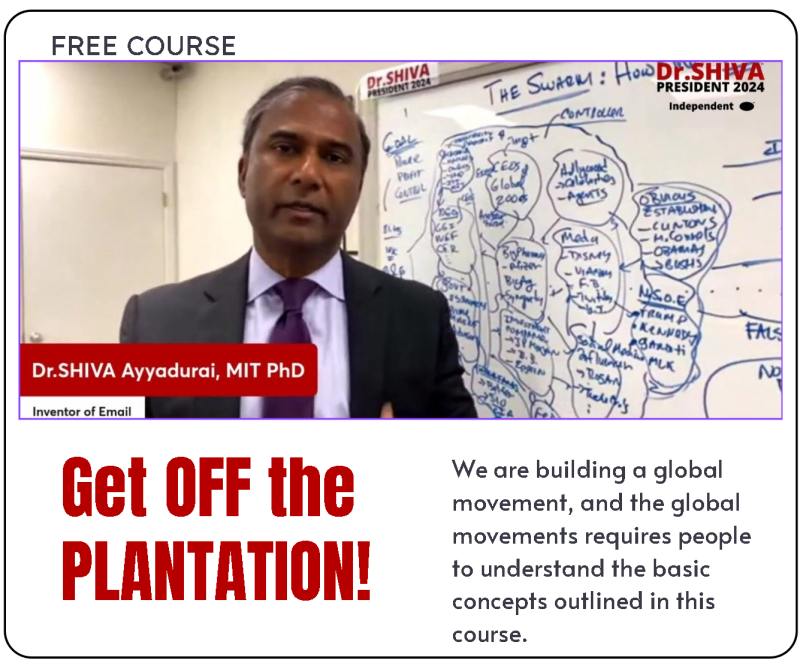
By Dr. V.A. Shiva Ayyadurai | April 2, 2015
Are cancer tests helping or hurting?

Turmeric, a small flowering plant, was originally cultivated as an herb in southern parts of India and has been in use in Indian cuisine for many centuries. Hailing from the ginger family (Zingiberaceae), turmeric is mildly aromatic and has scents of orange or ginger. The roots of the plant are boiled, dried and ground to form the yellow-orange powder that is used as an ingredient in a majority of items in Indian cuisine.
Turmeric has been known to the world as Indian Saffron, because of its color, and has been used throughout history as a condiment, a healing remedy and a textile dye. Turmeric as a spice has very few calories (1 tablespoon = 24 calories) and zero cholesterol.
Why This News is Relevant: Western Approach is Nowhere Near Defeating Cancer
Turmeric powder is widely used as a spice in cooking and gives Indian
curry its flavor and yellow color. India is the largest producer and
consumer of turmeric, as 80% of the world turmeric production is from
India. Asian countries like Pakistan, China, Taiwan, Thailand and
Vietnam also produce turmeric.
Restaurant Owners Need a Real Solution for Social Media
Know the Truth: Western Science Lacks a Holistic Approach
Traditionally, Turmeric is used as a powerful anti-inflammatory in eastern countries, especially India and China. Turmeric has great religious significance in the Hindu tradition; the Hindu sacred thread of mangalasutra used in weddings is adorned with turmeric; it is customary to apply turmeric on anything as it is generally considered a harbinger of all things good. As per the traditional Indian systems of medicine, Siddha and Ayurveda, it is a tri-doshic herb, having pungent, bitter and astringent tastes.
As an herb, Turmeric is used to support liver detoxification, to balance cholesterol levels, to assist digestion and to improve the complexion of the skin. Indian Women apply turmeric on the skin for its toning effects as well as its antibacterial property that protects the skin from infection and harsh sunlight.

Traditionally, Turmeric is used as a powerful anti-inflammatory in eastern countries, especially India and China. Turmeric has great religious significance in the Hindu tradition; the Hindu sacred thread of mangalasutra used in weddings is adorned with turmeric; it is customary to apply turmeric on anything as it is generally considered a harbinger of all things good. As per the traditional Indian systems of medicine, Siddha and Ayurveda, it is a tri-doshic herb, having pungent, bitter and astringent tastes.
As an herb, Turmeric is used to support liver detoxification, to balance cholesterol levels, to assist digestion and to improve the complexion of the skin. Indian Women apply turmeric on the skin for its toning effects as well as its antibacterial property that protects the skin from infection and harsh sunlight.
Turmeric was unknown to the western world, until the Arab traders introduced them in the western market in the 13th century. It was first mentioned by Marco Polo, in AD 1280, as finding a plant root with qualities similar to that of saffron.

Western science has recognized Curcumin, one of the most significant constituent present in Turmeric, as an anti-oxidant, that supports a healthy inflammatory response, and thereby promotes general well-being. Clinical studies done on animals by injecting doses, have shown promising effects of curcumin in the fight against cancer. Even though studies in humans are still in its early stages, there seems to be hardly any research available on Turmeric, as a dietary supplement, for promoting overall wellbeing.
Until the mid 20th century, western scientists showed little interest on the health benefits of Turmeric. In the last few years, there has been some research that has established the key ingredient of turmeric and has identified its anti-carcinoegenic, anti-inflammatory and anti-oxidant properties but there has been very little exploration of the holistic and systemic rationale behind eastern medicine embracing turmeric as an all-powerful herb.
Find Your Way: The Systems Approach to Understanding Human Body

I am a Systems Scientist and I hold 4 degrees from MIT. Most of my life starting all the way back when I was 6 years old, has been devoted to systems science. This systems approach helped me understand the true potential of this wonder herb, turmeric.
In my early years as a child, I had witnessed by grandmother playing shaman in the village I grew up in Tamilnadu, a state down south of India. She had had no formal education but had the ability to treat people of various disorders and diseases and was widely respected by the villagers. Later in my life, drawn by my early exposure to my grandmother’s practices, I researched into the medicinal approach prevalent in Tamilnadu centuries ago – the practice of Siddha. As I studied it more and more, I understood that the practice of Siddha was a highly evolved scientific system of treating people of diseases/disorders. I was truly amazed at its strong and systematic framework that helped it achieve a holistic approach to treatment, and a level of sophistication on a scientific foundation that had hitherto been unattributed to the practice.
My life has been dedicated to bridging east and west, scientific and traditional, ancient and modern. After nearly four decades of research, I discovered Systems Health. The Systems Health approach is what is needed to integrate eastern and western knowledge so we can get a holistic understanding of anything related to health. At Systems Health, I have created lecture videos on various topics that help anyone interested in alternative health approaches to understand and benefit from the truly evolved sciences of Siddha/Ayurveda, their modalities, as well as various herbs they used in treating people.
I have also created a specific, east-west, systems based course on turmeric that can help you as an individual, as a health care practitioner or as an MD, to understand how turmeric works based on decades of scientific research.
Be the Light: Explore the Systems Health Course on Turmeric
Today western science has provided us powerful tools to understand how things work at a molecular level. As a Systems Biologist with a Ph.D from MIT, I combined my academic training in research and molecular systems science, with what I have learned of eastern systems of medicine from my grandmother as well as other eastern practitioners. This helped me create Systems Health that provides a revolutionary framework ancient systems of medicine. Systems Health is a curriculum of courses that bridges the worlds of ancient and modern, traditional and scientific, east and west.
I have also created a complete Certification Program where you can become a Systems Health practitioner and become conversant as an educator bridging these two worlds. You can take the entire Certification Program or you can take a single course. e.g. on turmeric., to get a feel for the new approach to understanding things like turmeric from both perspectives.
To take the first step to understand the power of Systems Health educational framework, I suggest that you begin with the course lecture titled “Turmeric – Cross-Systems Wonder Drug”. This lecture gives you the information and framework to truly understand the power of this wonder herb from a holistic, systems perspective.
The lecture starts with background information on turmeric and describes how turmeric was used traditionally over many centuries in Indian and other cultures of the east. It then describes how western science has interpreted and understood the properties of turmeric and goes on to detail how turmeric acts as a true cross-systems wonder herb.
Testimonials: Systems Health Actually Works
Join the Revolution: Special Offer For Those Interested In This Course
The course benefits anyone interested in general health. If you are a Medical/Health Practitioner, you may use the Concepts of this Lecture to recognize:
- That Turmeric has many potential benefits, i.e. it is a cross systems herb
- When to use Turmeric on a regular basis
- When to prescribe Turmeric for certain conditions
- The contraindications of Turmeric
As part of my commitment to benefit the worlds of east and west, ancient and modern, traditional and scientific, you can take the Turmeric: Cross-Systems Wonder Drug course individually without having to sign up for the practitioner program. My intention is that you will not only learn about turmeric in a whole new way, but will also be inspired to be a Systems Health practitioner, from which you can become an educator bridging science and tradition that is so needed in our society today to understand the indigenous value of medicine that my grandmother taught me many years ago.
Course Code: SHSM01
Turmeric is an incredible herb used extensively in Indian cuisine. It is remarkable in its antiseptic, anti-inflammatory and anti-carcinogenic properties. Today, there are nearly 6000 scientific papers published on the amazing medical benefits of this herb that earlier cultures had already recognized and assimilated into their diet.

Turmeric is an incredible herb used extensively in Indian cuisine. It is remarkable in its antiseptic, anti-inflammatory and anti-carcinogenic properties. Today, there are nearly 6000 scientific papers published on the amazing medical benefits of this herb that earlier cultures had already recognized and assimilated into their diet.
This lecture consolidates all of the findings of the eastern as well as western scientific research on the remarkable benefits of this herb. MIT-trained systems scientist Dr. VA Shiva Ayyadurai presents this lecture.
Syllabus
*Background * Turmeric * Tradition * Science * Cross-Systems * Summar
SKU: SHSM01.
Category: Systems Medicine.

As a result, in lieu of the amount of $599 that you have to pay to get access to the Systems Medicine Certification Program, you can pay only $99 and get access to the Course Video on Turmeric.

Also, the credit for taking this Course as well as the amount of $99 you paid will be accounted for when you do want to enrol for the full Systems Medicine Certification Program.

60-Day Money Back Guarantee: I am confident that you will appreciate the value of my Course videos in providing you with a holistic and scientific approach to understanding the benefits of eastern medicine and herbs, in this case, turmeric. In case you are not satisfied for some reason, you can claim a full refund of the amount you paid, any time within 60 days of your purchasing the Course.
You May Also Be Interested In












